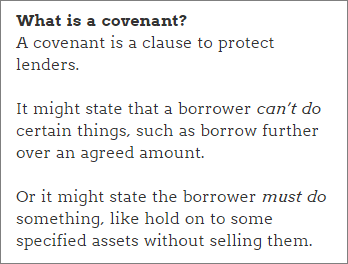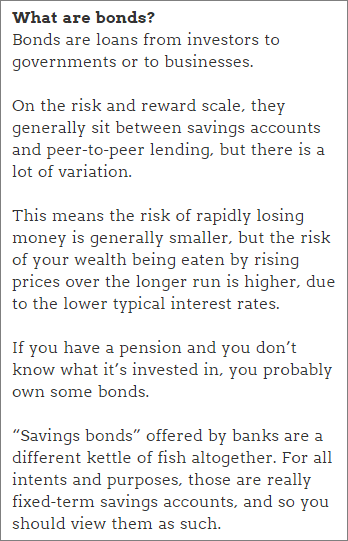To get the best lending results, compare all P2P lending and IFISA providers that have gone through 4thWay’s rigorous assessments.
The Biblical Importance of Legal Covenants
Thanks to David and UK Bond Network for letting us pinch this educational article from their own blog.
Legal covenants are of vital importance to investors when investing in debt of any kind – be it personal loans, business loans (including minibonds), corporate bonds (as issued via UKBN), or indeed government bonds. This importance is twofold:
are of vital importance to investors when investing in debt of any kind – be it personal loans, business loans (including minibonds), corporate bonds (as issued via UKBN), or indeed government bonds. This importance is twofold:
- They prevent the borrowing entity misappropriating the funds you invest; and
- They provide protection in the event of default.
In recent times,  investors (including institutional investors) have lost many protections. As far back as August 2013 the FT was highlighting that the high yield bond market was experiencing “more aggressive structuring whenever companies believe they can get away with it”.
investors (including institutional investors) have lost many protections. As far back as August 2013 the FT was highlighting that the high yield bond market was experiencing “more aggressive structuring whenever companies believe they can get away with it”.
However covenants don’t just apply to corporate bonds. In an albeit twisted example largely caused by the negative effects to Ukraine’s economy from the seizure of Crimea and Eastern Ukraine by separatist rebels, Ukraine’s debt-to-GDP ratio has increased to 71.5%.
This figure might not seem significant to UK residents in the knowledge that our ‘number' is in excess of 90%, however it is of particular consequence to that sovereign – a covenant contained within $3 billion of bonds sold to Russia in December 2013 set a limit on Ukraine’s debt-to-GDP ratio of 60%.
Whilst this particular example is strewn with murky socioeconomic factors, it nonetheless highlights the importance of covenants across all classes of fixed income – be it a regional bank lending to a small business, or one nation state lending directly to another – covenants protect investors when finances become stretched.
Conspiracy theories aside, the Russia-Ukraine scenario highlights precisely why investors need covenants.
A range of key factors determine whether or not you decide to invest in an organisation’s debt – profitability, revenue, security available, or coverage ratios (such as debt-to-GDP, or debt-to-income for a corporate).
Whatever these key factors are, when you lend to an organisation upon the basis of them, you want to ensure these fundamentals persist in that organisation for the duration of the investment.
For example, if a key consideration is profitability when lending to a company, you want to ensure that directors do not start paying themselves excessive salaries, consequently stripping funds out of the company and in turn eroding profitability.
Alternatively, you may find that the inclusion of a covenant that director salary increases can only be made relative to net earnings – i.e. after interest, depreciation and amortisation – may be suitable protection of your interests.
It’s not difficult to see how failure to include appropriate covenants could be incredibly damaging and or erode the value of any fixed income investment.
And it’s not just investors investing directly in the debt of particular organisation that should be aware of the importance of covenants – high yield bond funds will almost certainly be holding bonds issued over the past 18 months.
These will be bonds that have been issued with a lack of covenants as the borrowers have been able to ‘get away with it’: investors, including institutional investors, are often desperate to obtain yield sometimes with great disregard for these more nuanced, but crucially important terms.
It is because of these factors that our Lending Team endeavour to put appropriate covenants in place whenever relevant for our transactions.
Manual credit analysis, professional due diligence, legal structuring of security and verification of information – all of this work that they conduct for the benefit of our investors could be left meaning nothing unless they go the last, and often most challenging step, of putting appropriate covenants in place.
Our service is free to you. All P2P lending companies will be included in our fair and accurate comparison tables once we have finished adding them all. We don't receive compensation from UK Bond Network, but we do from some of the other P2P lending companies for providing you with the 4thWay® Risk Ratings and 4thWay® Insight Reports for free, and then we’re paid when you click through from us and open accounts with them. This doesn't affect our editorial independence. Learn How we earn money fairly with your help.


